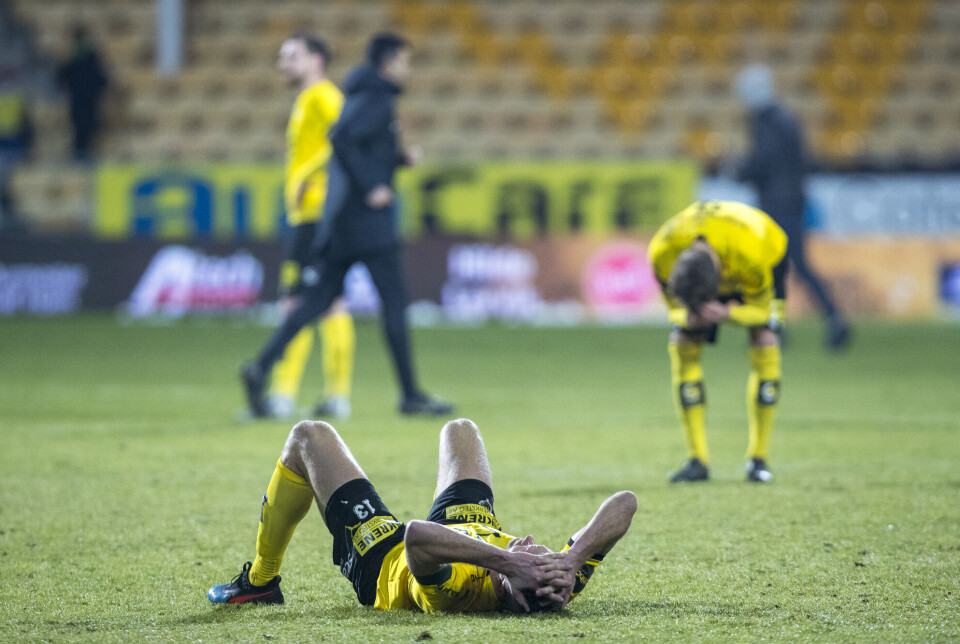THIS CONTENT IS BROUGHT TO YOU BY THE University of Agder - read more

What causes collective collapse on the football pitch?
A football team is losing 4-0 in a promotion match. Within six minutes, the game is turned around. New research may provide some insights into why.
Åråsen football stadium, 11 December 2019. The battle for a spot in the Norwegian premier league, Tippeligaen, is underway. Lillestrøm is fighting to retain its place while Start is pushing for promotion.
The outcome will be decided through two promotion matches.
The previous game ended with Start winning 2-1 on its home turf. A promising start for Start, but Lillestrøm manages to score a goal just one minute into the second game.
And they kept scoring.
“In the end, Lillestrøm secured a 4-0 lead. With 75 minutes played, it seemed highly unlikely for Start to mount a comeback. But suddenly Start scored a goal, and everything changed. I wanted to study that more closely,” says Gaute Sørensen Schei.
Started with one goal
He conducted research on the communication during this match from the perspective of the Start players.
“The momentum of the game shifted when Start scored its first goal. According to the players, they could sense uncertainty among their opponents. Whether that was real can't be confirmed, but for the Start players, it was. It affected the course of the game,” says Schei.
In a span of six minutes, Martin Ramsland of Start managed to secure a hat-trick. The final score stood at 4-3 in favour of Lillestrøm, resulting in an aggregate score of 5-5 across both matches.
With a higher number of away goals, Start secured a promotion to the Norwegian premier league.
An appetite for victory
“You think it's over. Many of the players were looking at the grass. But suddenly, we found an appetite for victory. This is the craziest experience ever,” Ramsland told Eurosport after the match.
Schei explains that Lillestrøm experienced what is called a collective collapse.
"Negative communication among their players increased, leading to heightened stress. For Start, the opposite happened. But it's also interesting to note that Start did not experience a collapse before, even when facing a 4-0 deficit over a long time,” he says.
The researcher emphasises that the players’ physical demeanour during critical moments in the match is essential. It is something that can be contagious within the team. Therefore, it's crucial that players are aware of this effect.
“Everyone knows that pivotal moments can occur during a match. Top-level teams must be able to handle that. There are clear strategies for this. It's an ongoing process that requires consistent prioritisation. When the fourth goal was conceded, and all hope was lost, the Start players described how they rallied together,” says Schei.
He has previously written about the phenomenon of emotional contagion within a team. He examined how feelings accumulate among players and how emotions can permeate throughout the team.
“You can only control your own thoughts and actions. The way you think and approach your role can be influenced. We have identified specific measures that teams can implement to foster teamwork and prevent collective collapses,” says Schei.
Research-based recommendations
These are the recommended measures:
- Establish a strong and constructive team culture.
- Develop shared mental models that are practiced under high-pressure situations.
- Define clear role descriptions that are understood by all involved.
- Foster constructive and positive communication within the team, also when facing challenges and crises.
- Implement constructive strategies for regulation, involving the creation of rules and the development of norms that prevent negative communication. Also devise specific strategies to maintain team unity during difficult periods.
- Ensure players are physically and mentally well-prepared for matches.
References:
Schei et al. A Qualitative Exploration of Collective Collapse in a Norwegian Qualifying Premier League Soccer Match—The Successful Team's Perspective, Frontiers in Psychology, vol. 12, 2021. DOI: 10.3389/fpsyg.2021.777597
Schei, G.S. Communication in elite team sports, Doctoral dissertations at the University of Agder, 2023.
———
Read the Norwegian version of this article on forskning.no

This content is paid for and presented by the University of Agder
This content is created by the University of Agder's communication staff, who use this platform to communicate science and share results from research with the public. The University of Agder is one of more than 80 owners of ScienceNorway.no. Read more here.
More content from the University of Agder:
-
Fear being rejected: Half pay for gender-affirming surgery themselves
-
Study: "Young people take Paracetamol and Ibuprofen for anxiety, depression, and physical pain"
-
Research paved the way for better maths courses for multicultural student teachers
-
The law protects the students. What about the teachers?
-
This researcher has helped more economics students pass their maths exams
-
There are many cases of fathers and sons both reaching elite level in football. Why is that?




































